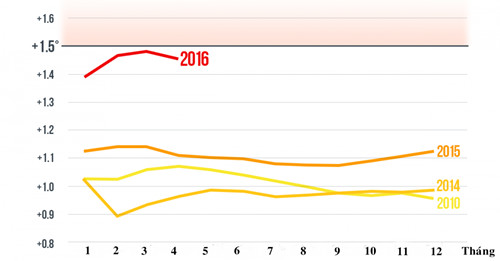Summer temperatures will continue to be higher in the next 50 years
Summer temperatures in most parts of the world will often break the current record over the next 50 years.
According to Science Daily, the National Center for Atmospheric Research (NCAR) warns that if climate change continues to occur today, the probability of any summer between 2016 and 2080 is higher than the level. The current continent is 80% worldwide, except Antarctica is not included in the study. Implementing targets to curb greenhouse gas emissions can reduce this ability to 41%.
"Severe hot summers have always been a challenge to society, increasing the risk of human health problems and crop damage, making drought worse , " Flavio Lehner said. , an expert working at NCAR, said.

The average temperature in the first 4 months of 2016 and the years of 2010, 2014, 2015, compared with the average in the period of 1881 - 1910. (Photo: Climate Central).
The research team consisting of scientists Clara Deser and Benjamin Sanderson at NCAR used two model groups to survey future summer temperatures. Both were created by running the "Community-Based Earth System Model" 15 times at NCAR's Wyoming Supercomputing Center, assuming unabated greenhouse gas emissions and other assumptions are The country fulfills its goal of reducing emissions.
The group then compared the results obtained with summer temperatures between 1920 and 2014, as well as 15 sets of simulated summer temperatures during the same period.
The results show that, during the years 2061 - 2080, there is 90% of the possibility that summer in many large regions in North America, South America, Europe, Asia and Africa will be hotter than any summer. ever recorded in history, if greenhouse gas emissions do not decline.
Some regions where the possibility of hotter summers than the record of less than 50% includes: Alaska, the center of the United States, Scandinavia, Siberia and mainland Australia. These places have very different natural summer temperatures, making it more difficult for scientists to detect the effects of climate change.
If greenhouse gas emissions are reduced, the probability of future summer temperatures is hotter than the past record levels are not evenly spread. In the east coast of the United States and some large tropical regions, the probability remains above 90%, even when emissions are reduced. Some other regions of Brazil, Central Europe and eastern China, this figure is less than 50%.
"Extreme temperatures endanger people all over the world," said Eric DeWeaver, who works at the US National Science Foundation (NSF).
- 4 troublesome summer makes you sick
- Humans will change for years to come
- Summer solstice is always on Tuesday
- In the next 80 years, going out in the summer will be the same as suicide
- Summer snow falls in China
- Climate change will continue over the next 1,000 years
- The temperature in the 48 states of the US is higher than the average
- Arctic temperatures are 20 degrees Celsius higher than average
- Unexpected properties of high-temperature superconductors
- Tree sunscreen withstands Antarctic summer
- Decoding Hanoi cold rain in mid-summer
- 2006: The year with the highest temperature in 150 years
 Is the magnetic North Pole shift dangerous to humanity?
Is the magnetic North Pole shift dangerous to humanity? Washington legalizes the recycling of human bodies into fertilizer
Washington legalizes the recycling of human bodies into fertilizer Lightning stone - the mysterious guest
Lightning stone - the mysterious guest Stunned by the mysterious sunset, strange appearance
Stunned by the mysterious sunset, strange appearance